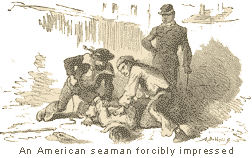Foreign Affairs under Jefferson
 War between revolutionary France and Britain broke out in the spring of 1803. American commercial interests initially prospered because trade with the West Indies was carried in U.S. ships, while belligerent ships were bottled up in the war. This prosperity also attracted many deserters from the Royal Navy, who heard that American sailors enjoyed better working conditions and twice the pay.
In 1805, the British under Lord Nelson destroyed the French fleet in the Battle of Trafalgar; henceforth Britain ruled the seas and stepped up her campaign to regulate the activities of neutral nations.
American rights as a neutral power began to suffer in the following ways:
War between revolutionary France and Britain broke out in the spring of 1803. American commercial interests initially prospered because trade with the West Indies was carried in U.S. ships, while belligerent ships were bottled up in the war. This prosperity also attracted many deserters from the Royal Navy, who heard that American sailors enjoyed better working conditions and twice the pay.
In 1805, the British under Lord Nelson destroyed the French fleet in the Battle of Trafalgar; henceforth Britain ruled the seas and stepped up her campaign to regulate the activities of neutral nations.
American rights as a neutral power began to suffer in the following ways:
- The Royal Navy resumed the practice of Impressment: halting American ships on the high seas to reclaim deserters (or other English-speaking sailors)
- The British issued orders in council that required licensing for neutral ships attempting to trade with Europe
- In 1806 and 1807, the French reacted by issuing decrees threatening seizure of any ship obeying the British orders in council.
Britain and France seized hundreds of American ships, but the most critical event occurred in the
Chesapeake Affair of 1807, a major challenge to American
Neutral Rights.
Jefferson understood that the United States was not prepared to go to war against a great power, instead opting for what he labeled “peaceable coercion.” Responding to the president’s urging, Congress passed the
Embargo Act of 1807. This measure prohibited the exportation of all goods produced in the United States and barred all American ships from sailing for any foreign port. Jefferson was inclined to use this approach because he recalled the effectiveness of embargos during the American Revolution.
The impact of the embargo was felt far more sharply in the United States than in England or France. Economic distress was experienced not just among shipping and manufacturing interests, but also among farmers and small tradesmen. Smuggling became a way of life for many. Discontent was so great that the moribund
Federalist Party began to reemerge as a force in some areas.
In 1808, Jefferson announced his decision not to seek a third term, but before leaving office he gave his successor a break by seeing to the repeal of the embargo and the enactment of a substitute measure. In 1809, Congress passed the Non-Intercourse Act, which reopened trade with all nations except England and France. It also offered resumption of trade with the belligerents if they would respect American
neutral rights. It was the embargo turned inside out.
 War between revolutionary France and Britain broke out in the spring of 1803. American commercial interests initially prospered because trade with the West Indies was carried in U.S. ships, while belligerent ships were bottled up in the war. This prosperity also attracted many deserters from the Royal Navy, who heard that American sailors enjoyed better working conditions and twice the pay.
In 1805, the British under Lord Nelson destroyed the French fleet in the Battle of Trafalgar; henceforth Britain ruled the seas and stepped up her campaign to regulate the activities of neutral nations.
American rights as a neutral power began to suffer in the following ways:
War between revolutionary France and Britain broke out in the spring of 1803. American commercial interests initially prospered because trade with the West Indies was carried in U.S. ships, while belligerent ships were bottled up in the war. This prosperity also attracted many deserters from the Royal Navy, who heard that American sailors enjoyed better working conditions and twice the pay.
In 1805, the British under Lord Nelson destroyed the French fleet in the Battle of Trafalgar; henceforth Britain ruled the seas and stepped up her campaign to regulate the activities of neutral nations.
American rights as a neutral power began to suffer in the following ways: